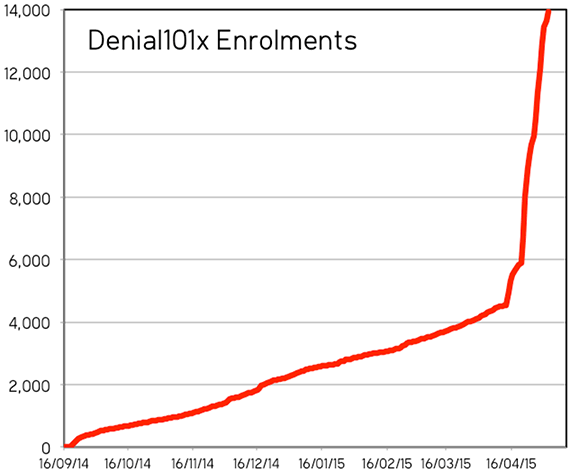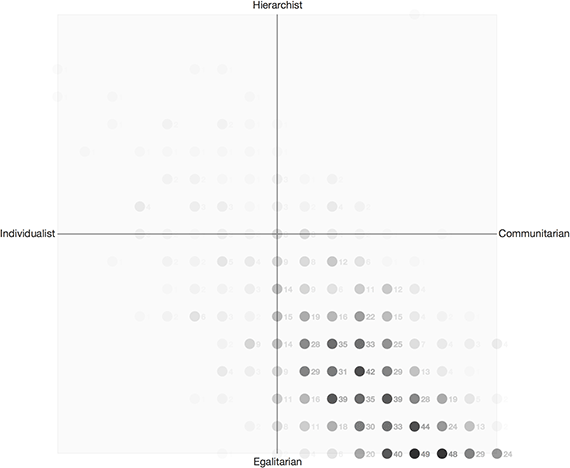Week 1 of Denial101x: 14,000 students from 159 countries
Posted on 4 May 2015 by John Cook
Last week, we launched our Massive Open Online Course (MOOC), Making Sense of Climate Science Denial. Already, there's been a great deal of interest in the course, with articles in Newsweek, Salon, Lifehacker and the formidable IFLScience. Currently, the MOOC has 14,000 enrolled students from 159 countries.

As you might imagine, the discussion forum has been vigorous and thought provoking, with a great deal of questions, suggestions and feedback. The positive feedback from the students, enjoying and learning from the week 1 material, has been overwhelming. Here's a word cloud from the student feedback.

Possibly the lecture of Week 1 that made the biggest impression was the five characteristics of science denial, summarised with the acronym FLICC. Understanding the techniques used to manufacture doubt about the science are essential to effectively respond to misinformation. The five characteristics originate from science blogger Mark Hoofnagle, who is also enrolled in Denial101x. FLICC forms the framework that will be used throughout the course. Each time we debunk a climate myth, we'll pinpoint which technique or fallacy the myth uses to distort the science.
Another feature of week 1 that struck a chord with students was the research finding that political ideology is a major driver of climate science denial. To reinforce the lesson on cultural cognition, students filled out a short survey to determine where on the Individualist-Communitarian and Hierarchise-Egalitarian scale they sat. This survey, and the resulting distribution of Denial101x students (shown below), provoked a great deal of discussion in the forum:

Our video interviews were immensely popular and frankly, rightly so. We were privileged to showcase some amazing interviews with scientists talking about the psychology of science denial, the techniques used to cast doubt on the science and compelling accounts of how scientists get attacked. We also made a list of full interviews available for scientists such as Naomi Oreskes, Katharine Hayhoe, Michael Mann and Stephan Lewandowsky.
You can view all our lectures and interviews on YouTube. However, I strongly recommend you enrol in the course rather than simply watch the videos. Rather than be a passive viewer, you can engage with our interactive activities that reinforce the videos and also interact with our global community of students on the forum.
In week 2 (released tomorrow), we debunk myths that cast doubt on the reality of global warming. Here's a sneak preview of our week 2 introduction video. We recorded this in Canada while interviewing cryosphere scientists. When we saw that it was snowing outsides, in a break between interview, we rushed outside and quickly recorded this intro!
So if you haven't enrolled already, be sure to visit edx.org/understanding-climate-denial and sign up! And also follow us on the Denial101x Twitter and Facebook pages, and share our content as we post it on social media!































 Arguments
Arguments



































The enrolment hockey stick!
@rocketeer very good, very good!
Any possibility of showing paid vs free registrations?
Like the pig and the chicken who met for a breakfasf of ham and eggs to discuss the farmer. The chicken was interested but the pig was committed.
Bob Wilson
What caused the surge in enrolments by mid april?
Alexandre, mid-April was when we started actively promoting the course in the press and on social media.
@5 Andy Skuce: although many would argue that it's has nothing to do with telling people about the course, but is an entirely natural phenomenon driven by a recovery from the non-internet age and anyway it doesn't exist because John Cook invented the data to hide the decline.
This is a useful course to understand all other denial phenomena as well. I've been applying the denial Framework to understand how the Animal ag industry has distorted our behaviors. For instance, human mother's milk has 5-6% protein content while the USDA recommends 30% protein in our diet - a Logical Fallacy, since mammalian infants require the MOST protein content in their diets.
Thank you, John Cook and all the faculty of Denial 101X!!!